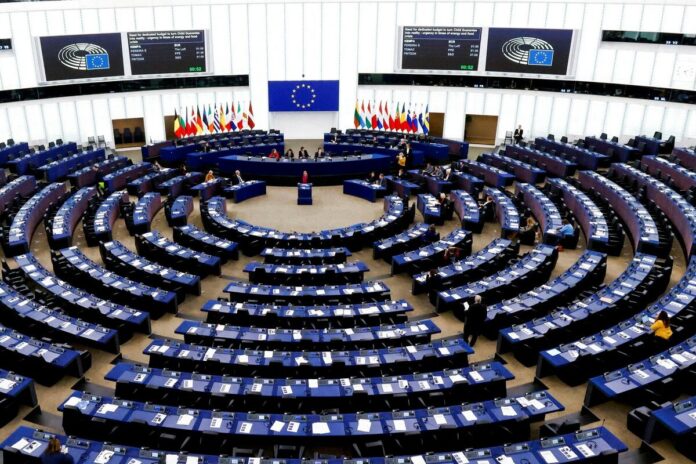Demands for Sanctions Against Those Violating the Constitutional Order of BiH at European Parliament Session
The European Parliament session on Wednesday evening focused on the situation in Bosnia and Herzegovina (BiH) and the secessionist threats that followed the Republika Srpska’s adoption of several unconstitutional laws. This session saw calls for sanctions against individuals violating the constitutional order of BiH.
During the debate in Strasbourg, Kristof Hansen, a representative of the European Commission, highlighted that BiH is currently facing an institutional and political crisis. He urged government officials in the country to prioritize reforms aimed at advancing towards European Union (EU) integration.
Hansen noted that the RS entity took a significant step backward by enacting an unconstitutional law on February 27, which forbade the operations of the Court and Prosecutor’s Office of BiH, the State Investigation and Protection Agency (SIPA), and the High Judicial and Prosecutorial Council within RS, thus jeopardizing BiH’s constitutional order and the functionality of its institutions.
This legislative move was triggered following the initial conviction of Dodik in the Court of BiH on February 26, where he received a one-year prison sentence and a six-year ban from holding office for disregarding the High Representative’s decisions.
The unilateral revocation of BiH’s jurisdiction over part of its territory is unconstitutional, a fact reaffirmed on March 7 by the Constitutional Court of BiH, which issued a temporary measure to suspend the contentious law.
Despite this binding decision from the Constitutional Court and international appeals to maintain the constitutional order, the RS authorities have vowed to uphold the regulation.
Hansen stated, “The EU expects politicians to avoid actions that could further division and escalate tensions,” while also pointing out that the RS’s new law concerning ‘foreign agents’ poses a risk to fundamental freedoms.
As a response to the rising tensions caused by unconstitutional legislation in RS, EUFOR has decided to increase its troop presence in BiH, with reserve forces arriving on March 11 as a precautionary measure.
Hansen made it clear that the EU’s stance is unequivocal: “We expect the RS authorities to honor the Constitutional Court’s decisions, suspend laws that threaten the constitutional order, and engage in dialogue to ease tensions.” He emphasized the necessity of respecting BiH’s sovereignty and territorial integrity, pledging that the European Commission would continue closely monitoring the situation, particularly regarding the RS’s potential adoption of a new Constitution, which was discussed at the RS Assembly session on March 12.
‘Putin’s puppet’
During the discussions at the European Parliament, calls for sanctions against those violating the Dayton Peace Agreement were raised. MEP Tineke Strik, who initiated the hearing, labeled Dodik’s actions as a threat to the peace and stability of BiH and described him as “a puppet” of Russian President Vladimir Putin in the Balkans.
She asserted, “Dodik does not act in the interests of citizens or their welfare. He is willing to comply with Moscow’s demands, even if it leads to conflict,” emphasizing that the pro-Russian leader of the RS seeks to maintain his power and enrich himself.
Strik urged the EU to respond with sanctions, including asset freezes and entry bans, to protect BiH.
‘The Kremlin’s destructive influence’
Czech MEP Ondrej Kolar stated that the EU must work to diminish “the Kremlin’s destructive influence on RS,” noting that “a hybrid war with Russia is also waged in the Balkans.” He recalled the situation in Ukraine, advocating for the deployment of soldiers to BiH to prevent a recurrence of the crises witnessed in the mid-90s.
Kolar insisted that those who infringe the Dayton Peace Agreement should face sanctions, expressing a sentiment of urgency to avoid abandoning BiH once more.
Croatian MEP Gordan Bosanac voiced concern over reports of separatist attempts to fragment BiH, asserting the importance of supporting a unified and sovereign BiH while condemning any form of separatism. He characterized the current system as one that has bred fear and unrest rather than progress, advocating for change.
“I urge the citizens of BiH to resist separatism. Do not allow hatred to breed again. We await you in the EU,” said Bosanac.
Throughout the European Parliament session, it was emphasized that BiH needs peace and security, rather than further divisions and tensions detrimental to the constitutional order.
Austrian MEP Andreas Schider remarked that Dodik’s secessionist actions and nationalist rhetoric threaten the entirety of BiH. He stressed that Europe must clearly support BiH in fulfilling its constitutional duties.
However, during the debate, there were scarce supportive voices for the RS authorities, with some MEPs advocating for stabilizing the Western Balkans instead of creating further conflict, as voiced by French MEP Andrea Roug, who cautioned against measures that might reopen past wounds.
Last week, the EU urged the RS political leadership to avoid provocative rhetoric and actions that undermine BiH’s sovereignty and territorial integrity.
The European Parliament session coincided with a new secessionist maneuver by the RS authorities, led by Dodik’s Alliance of Independent Social Democrats, which passed a resolution to commence the process of adopting a new Constitution for the entity.
The RS Parliament is expected to discuss the draft Constitution on March 13, which positions the entity as a state for the Serbian people and includes provisions for the right to self-determination and the establishment of its own military.
At the same time, the BiH Prosecutor’s Office issued an order for the detention of Dodik, RS Prime Minister Radovan Višković, and National Assembly Speaker Nenad Stevandić for questioning regarding their suspected involvement in actions against the constitutional order, though they were not detained as of March 12.
The arrest order followed an investigation that began in December last year, indicating a reasonable suspicion of attempts to undermine the constitutional order. The Prosecutor’s Office sought their detention for questioning after they failed to comply with summonses for statements.
Under the BiH Criminal Code, acts that threaten the constitutional order can result in a five-year prison sentence and the possibility of disqualification from holding public office.
News


